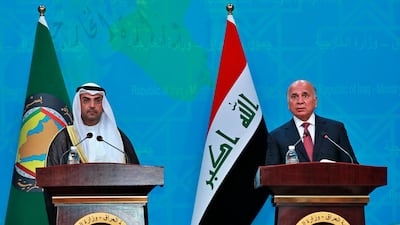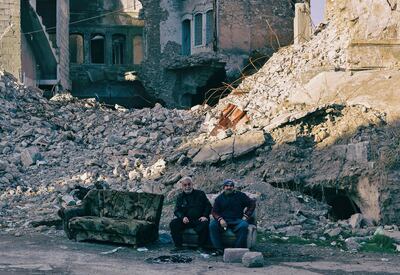How does anyone solve problems as complicated as the ones that plague Iraq? The answer remains illusive.
Addressing domestic challenges, such as unemployment, endemic corruption and security breaches, is part of the solution. Iraq is in need of internal solutions and external support. The country faces inconsistent diplomacy from its western allies, which is often overhauled whenever power changes in Washington or other capitals. Iraq also endures intense foreign interference from groups with no interest in its citizens' prosperity. Strong bilateral and regional ties could benefit the country and the wider region.
Monday's visit by a GCC delegation to Iraq should give the nation hope as it deals with these problems. A 2019 visit to Baghdad by former secretary general Abdullatif Al Zayani and a subsequent spate of visits by Iraqi officials to Gulf capitals laid the foundations for closer ties. During the most recent visit, Secretary General Nayef Al Hajraf said that member states will support Iraq as it tries to bolster sovereignty, stability and prosperity.
Baghdad is struggling on multiple fronts. There are fears that terrorist groups, particularly ISIS, could be using conditions created by the pandemic and general instability to increase their operations. On January 21, ISIS suicide bombers killed 32 civilians and wounded dozens in the capital. On Monday, British jets struck two targets in northern Iraq associated with the group. Last week, the Iraqi military killed a senior ISIS commander, who had claimed to be the group's "deputy caliph".
Dissatisfaction at corruption and foreign interference also needs to be urgently addressed. Not doing so puts at risk the hopes for a better future among Iraqi citizens. Demonstrators have been calling for change since October 2019, with activists and protesters targeted by militias and extremists.
Diplomatic attempts to solve deeply entrenched problems are difficult to come by in Iraq. This is precisely why the GCC's renewed confidence in those efforts represents a refreshing development.
The UAE is already involved in the reconstruction of various sites in Mosul, a historically significant city devastated after its occupation by ISIS, and there have been previous efforts by Gulf states to support the nation financially. In 2018, a conference held in Kuwait on Iraqi reconstruction pledged support amounting to $30 billion.
Monday's discussions focused in part on the nature of a constructive economic support package. Mr Al Hajraf announced the GCC's desire to hold a joint investment conference. Empowering the country's private sector is vital to tackling youth unemployment rates that are said to be at 25 per cent. Bordering major economies such as Saudi Arabia and Kuwait gives Iraq an opportunity to open new fronts of economic activity, where it could replicate the success of its joint industrial zone with neighbouring Jordan. Delegates discussed progress on a plan to connect Iraq to the GCC's power grid, something that would provide much-needed cheap and reliable electricity to support the country's population and its economic development. Further collaboration between the two could have other major economic benefits, given their huge oil reserves and young, ambitious populations.
January's GCC summit in Al Ula, Saudi Arabia, reinvigorated a bloc that has historically had serious diplomatic heft in the Middle East. By supporting Baghdad, the GCC imprints its constructive ambitions on the region, which offer hope and a path out of the political quagmire of recent years. Its engagement with Iraq would also balance out the more nefarious influence of other foreign actors there.
Iraq is struggling. The support of a united GCC could provide timely help for the region, by the region.



